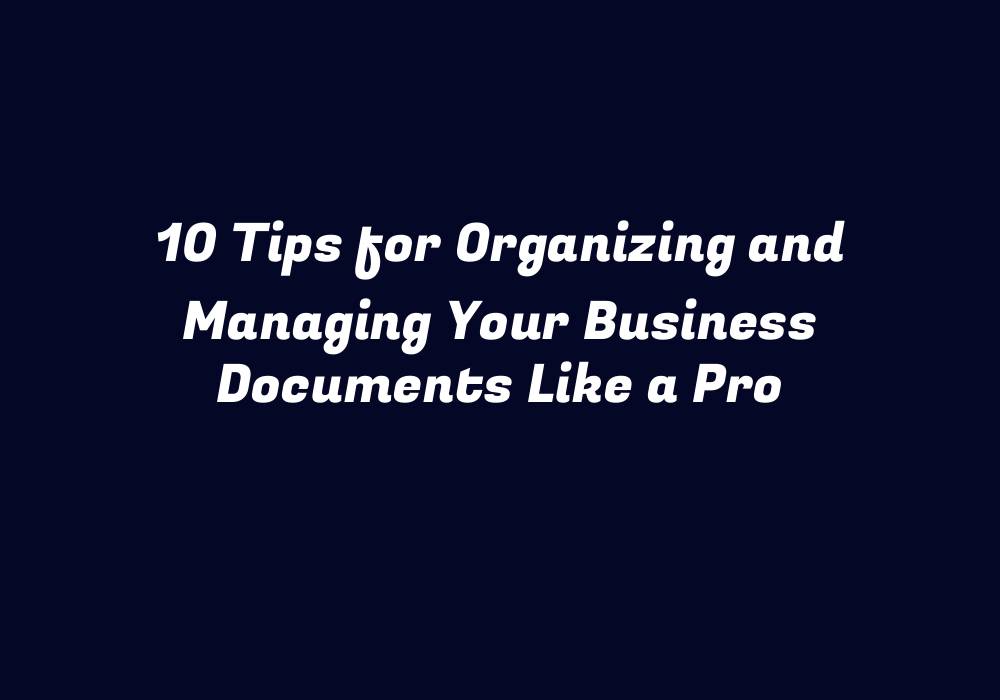10 Tips for Organizing and Managing Your Business Documents Like a Pro
Running a business involves handling various important documents that need to be organized and managed effectively. By properly organizing and managing your business documents, you can ensure efficiency and accuracy in your operations while also ensuring compliance with legal requirements. In this article, we will provide ten tips on how to organize and manage your business documents like a pro.
Tip 1: Create a designated filing system
The first step in organizing your business documents is to create a designated filing system. This could be an electronic database, physical storage, or both. Choose a system that works best for you and ensure that all important documents are filed in their appropriate location. You can also use tags and labels to easily locate specific files in the future.
Tip 2: Develop a document management policy
A document management policy is crucial to maintaining an organized and efficient work environment. This policy should outline how your business will manage, store, and dispose of documents. It should also include guidelines for creating new documents, ensuring they are properly filed, and handling any necessary revisions or updates.
Tip 3: Regularly review and update your files
Documents can quickly become outdated if not reviewed and updated regularly. Set a schedule for reviewing your business documents to ensure accuracy and compliance with legal requirements. This may involve updating contact information, revising contracts or agreements, or simply keeping track of changes in the industry.
Tip 4: Implement digital document management tools
In today’s digital age, there are numerous tools available to help you manage your business documents effectively. These can include cloud-based storage solutions, electronic signature software, and document scanning services. By using these tools, you can easily access your files from anywhere while also keeping them secure.
Tip 5: Maintain proper backup procedures
Accidents happen, and it’s essential to have a backup plan for your business documents. Implementing regular data backups is crucial to ensuring that important information is not lost in the event of a system failure or other disaster. Choose a reliable backup solution and test it regularly to ensure its effectiveness.
Tip 6: Train employees on proper document management
Employees should be aware of your business’s document management policies and procedures. Provide training on how to properly file, organize, and maintain documents within the system you have established. This will not only help keep files organized but also ensure that everyone is working efficiently and following best practices.
Tip 7: Develop a clear understanding of legal requirements
Different industries and jurisdictions have specific legal requirements when it comes to managing business documents. It’s essential to stay up-to-date on these requirements, as they can change frequently. Conduct regular reviews of relevant laws and regulations and ensure that your document management practices are in line with them.
Tip 8: Develop a system for tracking document expiration dates
Expiration dates on business documents can be critical to maintaining accuracy and avoiding legal issues. Create a system for keeping track of these dates, whether it’s through an electronic calendar or manual reminders. Make sure that all relevant parties are aware of the expiration dates so that necessary action can be taken before the document becomes invalid.
Tip 9: Use color-coded folders to enhance organization
Color-coding your file system can help you quickly identify specific documents and maintain an organized filing system. Assign a unique color to each category of files, such as contracts, invoices, or receipts, and use it consistently throughout your document management process.
Tip 10: Schedule regular cleanouts
Regularly scheduled cleanouts can help keep your business documents organized and prevent them from becoming overstuffed and disorganized. Set aside time each year to go through all of your files and either discard any unnecessary or expired documents, or move them to a designated storage area where they are easier to access when needed.
In conclusion, proper organization and management of business documents is essential for running an efficient and successful operation. By implementing these 10 tips, you can ensure that your documents are well-organized, up-to-date, and easily accessible when needed. Remember to regularly review and update your document management system to maintain its effectiveness and compliance with legal requirements.
